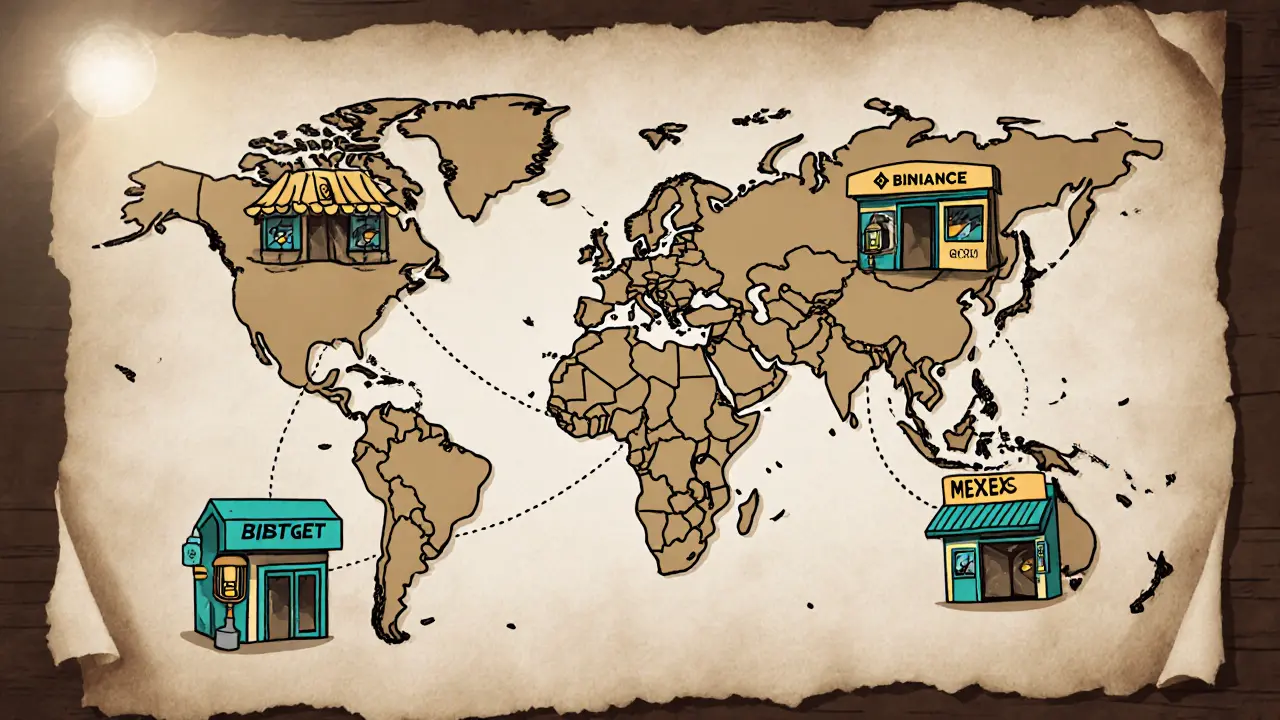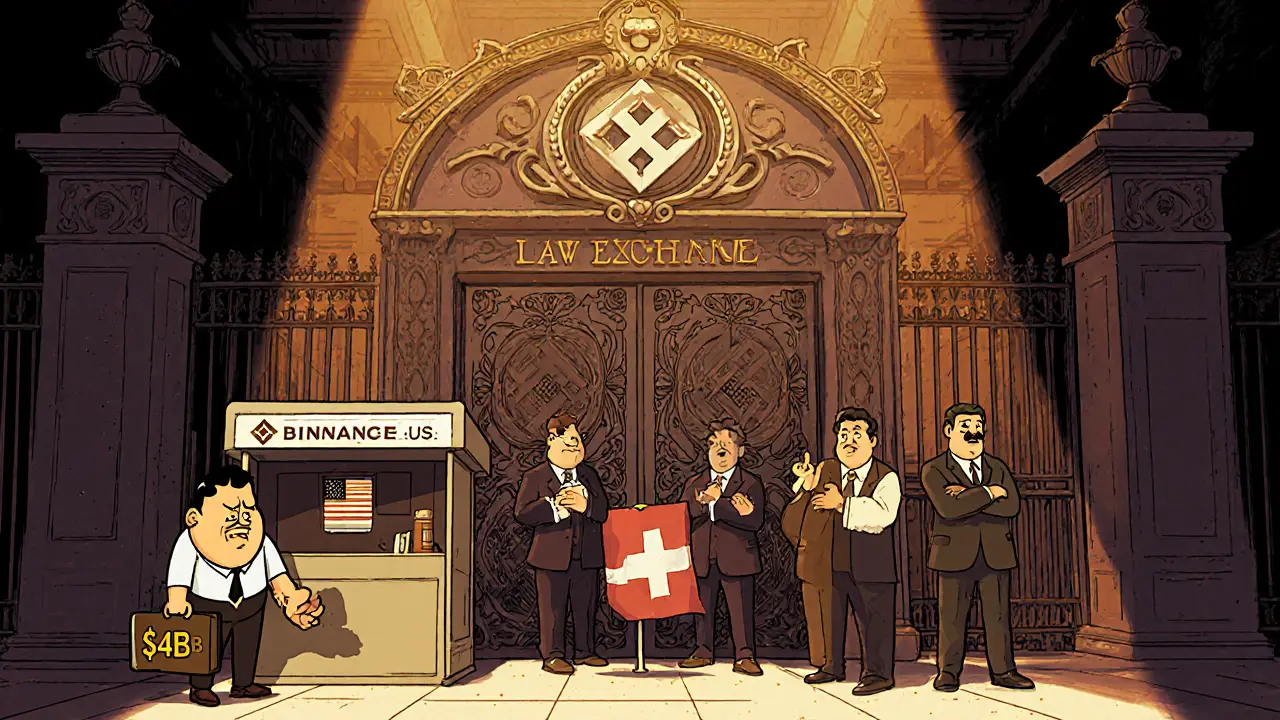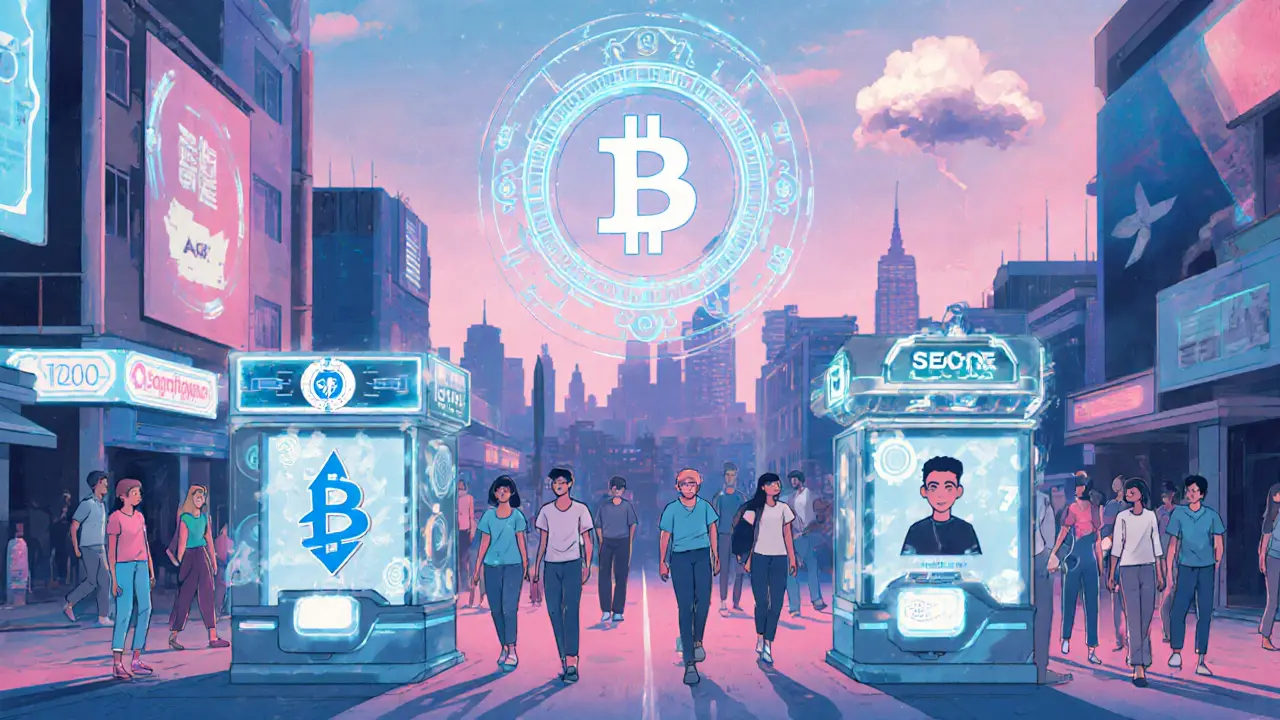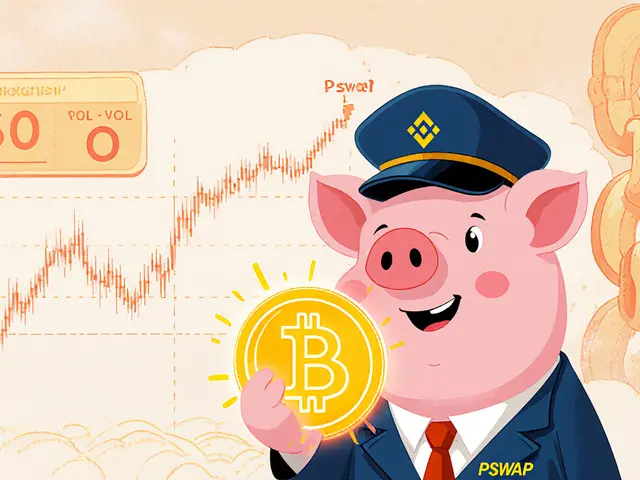
Cryptocurrency Exchange Availability Explorer
Explore which major exchanges operate in your region based on current 2025 regulatory frameworks.
Top Exchanges
- Binance
- Gate.io
- Bitget
- MEXC
Key Products
- Spot Trading
- Derivatives
- Staking
- NFT Marketplace
Regulatory Approach
- Licensing Required
- KYC/AML Compliance
- Security Standards
- Tax Reporting
Market Share
- Binance: 38%
- Gate.io: 9%
- Bitget: 7%
- MEXC: 8.6%
Exchange Availability for Selected Region
Note: This tool reflects general availability trends based on 2025 regulatory environments. Always verify current licensing status before trading.
Did you know that more than half of the world’s crypto trading volume in 2025 comes from just three exchanges, yet their services are split across dozens of country‑specific platforms? That fragmentation is the direct result of how each government treats digital assets. This article maps out which exchanges you can actually use, where they operate, and why regulations shape the landscape.
What the market looks like today
The global cryptocurrency exchange is a digital platform where users trade cryptocurrencies such as Bitcoin and Ethereum market was valued at USD 48.41billion in 2025 and is on track to hit USD 122.63billion by 2032, growing at a 14.2% CAGR. Spot trading dominates, accounting for roughly 61% of total exchange activity.
At the top sits Binance the world’s largest centralized crypto exchange, holding about 38% of global market share and moving $23.97billion in 24‑hour volume on October12025. Close behind are Gate.io (9% share), Bitget (7%) and MEXC (8.6%). The remaining top‑10 exchanges together control just under 46% of the market, showing a steep drop‑off after Binance.
Regulatory pressure: the biggest gatekeeper
Regulation is the single factor that decides whether a platform can operate in a country. The United States has a complex, multi‑agency cryptocurrency regulatory framework exemplifies this. In November2023 Binance agreed to a $4billion settlement and pledged a complete exit from the U.S. market within five years, spawning separate entities like Binance.US, Binance.TR, and Binance.KR to stay compliant.
Other regions follow similar patterns: countries with clear crypto‑friendly policies-such as Singapore and Switzerland-attract a full suite of exchange services, while nations with ambiguous or hostile rules (e.g., India’s fluctuating stance, or China’s outright ban) see limited or no local platforms.
Regional snapshots
Below is a quick look at how exchange availability varies across the world’s major zones.
- North America - The U.S. hosts only regulated subsidiaries (Binance.US, Coinbase, Kraken). Canada permits full‑service exchanges but requires strict AML/KYC compliance.
- Europe - The European Economic Area generally allows centralized exchanges, yet each member state applies its own licensing. Ireland, Germany and France have thriving exchange ecosystems, while Eastern European leaders like Ukraine ranked first in the 2025 Global Crypto Adoption Index see a surge in local platforms due to high retail demand.
- Asia‑Pacific - Singapore, Hong Kong SAR and South Korea support full‑service exchanges. Japan enforces a licensing regime that filters out non‑compliant operators. Meanwhile, Vietnam’s rapid adoption pushes regional players like Gate.io to launch localised services.
- Middle East & Africa - Jordan and Yemen rank high in crypto adoption despite economic instability, prompting niche exchanges to fill gaps. South Africa’s clear regulatory roadmap has attracted both global and home‑grown platforms.
- Latin America - Brazil and Argentina witness robust exchange activity, often driven by inflation concerns. However, regulatory uncertainty in Mexico slows wider adoption.

How the top exchanges adapt to regional rules
To stay operational, global players split their services into country‑specific versions. The table below compares the four leading exchanges and the regions they actively serve.
| Exchange | Global Market Share | Key Regions Served | Regulatory Strategy |
|---|---|---|---|
| Binance | 38% | Europe, Middle East, Southeast Asia (via localized subsidiaries) | Separate legal entities per jurisdiction; strict KYC/AML |
| Gate.io | 9% | Asia‑Pacific (Japan, South Korea, Vietnam), Latin America | Partners with local licensing firms; offers limited derivatives where banned |
| Bitget | 7% | North America (U.S. via Bitget US), Europe, Africa | Operates under a hybrid model - global platform plus region‑specific compliance units |
| MEXC | 8.6% | Middle East, South Asia, Emerging African markets | Leverages “light‑touch” licensing in jurisdictions with nascent crypto law |
Spot trading vs. derivatives: why region matters
Spot trading remains the dominant product on most platforms because it is easier to regulate - you simply exchange one asset for another. Derivatives such as futures or options often trigger additional licensing requirements. For instance, the U.S. Commodity Futures Trading Commission treats crypto futures as securities, forcing exchanges like Binance to shut down those services for American users.
In contrast, many Asian markets allow a broader suite of derivative products. Singapore’s Monetary Authority of Singapore (MAS) issues specific licenses for crypto‑derivative trading, which explains why Gate.io offers a full derivatives suite there while restricting it in Europe.
The rise of Decentralized finance (DeFi) a blockchain‑based financial ecosystem that operates without a central intermediary platforms
While centralized exchanges dominate volume, DeFi platforms are gaining traction, especially in regions where regulation hampers traditional services. Users in Venezuela and Jordan turn to decentralized swaps to bypass capital controls. However, DeFi’s lack of custodial protection and regulatory oversight means many governments still block access to popular DEX aggregators.

What the next five years could look like
Projections suggest the crypto exchange market will more than double by 2032. Growth will likely be uneven:
- Supportive jurisdictions (e.g., Singapore, Switzerland, Estonia) will see a proliferation of both centralized and decentralized services.
- Regulatory crackdowns in the U.S., India, and China will keep large exchanges fragmented, encouraging local startups to fill niche needs.
- Technological upgrades such as biometric authentication and AI‑driven risk scoring will become standard across all regions, raising the baseline for security compliance.
For traders, the key takeaway is simple: always check the local licensing status of an exchange before committing funds. A platform that’s fully compliant in Europe may be blocked or operate under a different brand in the U.S.
Quick checklist for choosing a regional exchange
- Confirm the exchange holds a licence from the relevant financial regulator in your country.
- Verify that KYC/AML procedures match local legal requirements.
- Check which products are available - Spot only, or also futures/options.
- Look for security features: multi‑factor authentication, withdrawal whitelist, cold storage ratios.
- Review the fee structure for both deposits and withdrawals; regional fees can differ substantially.
Frequently Asked Questions
Can I use Binance in the United States?
No. Binance withdrew its global service from the U.S. after a $4billion settlement. U.S. residents must use Binance.US or another regulated platform such as Coinbase.
Which exchange has the broadest global reach?
Binance, thanks to its network of localized subsidiaries (Binance.US, Binance.TR, Binance.KR, etc.), covers the most countries, though availability varies by regulation.
Is spot trading available everywhere?
Spot trading is the most widely permitted service, but some jurisdictions still restrict it for certain tokens deemed securities.
How do regulatory changes affect exchange fees?
Tighter regulation often raises compliance costs, which exchanges pass on through higher transaction or withdrawal fees, especially in high‑risk regions.
Are decentralized exchanges legal in most countries?
Legality varies. Some countries treat DeFi protocols as unregulated services, while others explicitly ban access to certain DEXs. Users should consult local law before trading.





Comments (6)
Akinyemi Akindele Winner
So Binance got slapped with $4B and now we got Binance.US like it's a McDonald's franchise? Lol. Meanwhile in Nigeria, we're still using VPNs to trade Bitcoin because the CBN thinks crypto is a cult. But hey, at least I can buy Dogecoin with my naira while my cousin in Lagos uses Binance.TR to pay for his generator fuel. Global finance? More like global chaos with a compliance sticker.
Patrick De Leon
Europe leads. Simple. Ireland and Germany have the regulatory clarity America lacks. Why are we still debating this? The US is a regulatory graveyard for innovation. Binance.US? A shell. Kraken? A shadow. Real traders use EU-licensed platforms. End of story. The rest is noise.
MANGESH NEEL
India banned crypto and now you're telling me Gate.io is thriving in Vietnam? Pathetic. Our government knows what's best. You think you're smart trading crypto while your parents die because healthcare is privatized? This isn't freedom, it's financial suicide wrapped in blockchain hype. The rich get richer, the poor get scammed. And you call this progress? Wake up. This isn't innovation, it's exploitation dressed in code.
Sean Huang
They're all controlled by the Fed via the IMF via the SWIFT network via the CIA via the shadow central banks. Binance.US? A honeypot. Binance.TR? A decoy. The real trading happens on DeFi protocols that don't exist on any map. You think the $4B settlement was real? Nah. That's just the price of playing along so they can track your wallet. Cold storage? It's all monitored. They're watching. Always watching. And if you're reading this, you're already flagged. 👁️
Ali Korkor
Good breakdown. If you're new to crypto, just stick to the big names with licenses in your country. Don't chase hype. Use 2FA. Keep your keys safe. And if you're unsure, wait a few months. The market always settles. You got this.
madhu belavadi
Why does everyone keep acting like Binance is some kind of hero? They got caught laundering money for cartels and now they're just moving their operations to Nigeria and Venezuela? This isn't regulation, it's relocation. And you're all just happy to keep feeding the beast.